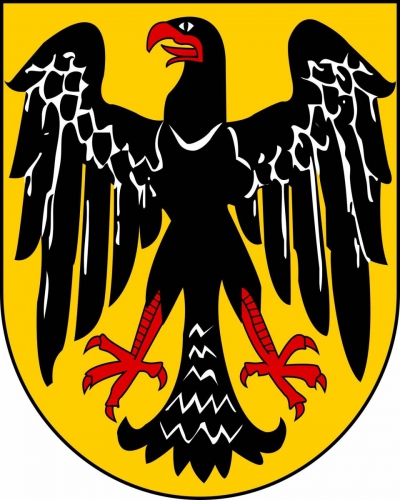The Constitution of the German Reich (German: Die Verfassung des Deutschen Reichs), usually known as the Weimar Constitution (Weimarer Verfassung), was the constitution that governed Germany during the Weimar Republic era (19191933). The constitution declared Germany to be a democratic parliamentary republic with a legislature elected under proportional representation. Universal suffrage was established, with a minimum voting age of 20. The constitution technically remained in effect throughout the Nazi era from 1933 to 1945, though practically it had been repealed by the Enabling Act of 1933 and thus its various provisions and protections went unenforced for the duration of Nazi rule.
The constitution's title was the same as the Constitution of the German Empire that preceded it. The German state's official name was Deutsches Reich until the adoption of the 1949 Basic Law.
The Weimar National Assembly (German: Weimarer Nationalversammlung), officially the German National Constitutional Assembly (Verfassunggebende Deutsche Nationalversammlung), was the popularly elected constitutional convention and de facto parliament of Germany from February 6, 1919 to June 6, 1920. As part of its duties as interim government, it debated and reluctantly approved the Treaty of Versailles that codified the peace terms between Germany and the victorious Allies of World War I. The Assembly drew up and approved the Weimar Constitution that was in force from 1919 to 1933 (and technically until the end of Nazi rule in 1945). Because it convened in Weimar rather than in politically restive Berlin, the period in German history became known as the Weimar Republic.

1919Jul, 31
German national assembly adopts the Weimar Constitution, which comes into force on August 14.
Choose Another Date
Events on 1919
- 5Jan
Nazi Party
The German Workers' Party, which would become the Nazi Party, is founded. - 23Mar
Italian Fascism
In Milan, Italy, Benito Mussolini founds his Fascist political movement. - 4May
Treaty of Versailles
May Fourth Movement: Student demonstrations take place in Tiananmen Square in Beijing, China, protesting the Treaty of Versailles, which transferred Chinese territory to Japan. - 19May
Turkish War of Independence
Mustafa Kemal Atatürk lands at Samsun on the Anatolian Black Sea coast, initiating what is later termed the Turkish War of Independence. - 29May
General relativity
Albert Einstein's theory of general relativity is tested (later confirmed) by Arthur Eddington and Andrew Claude de la Cherois Crommelin.

 English
English  español
español  français
français  português
português  русский
русский  العربية
العربية  简体中文
简体中文 